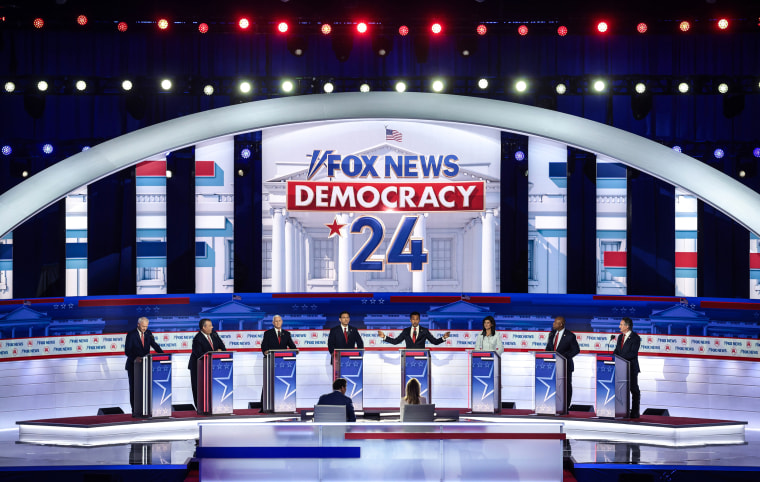The Republican Party’s varied and evolving ideas on how to address climate change were front and center Wednesday night at the first Republican presidential debate.
Still at issue, however, is just how much Republican leaders accept the overwhelming scientific consensus around global warming. Following an audience question on climate change, Fox News moderator Martha MacCallum asked for a show of hands on who among the candidates believed in human-induced climate change.
Only former Arkansas Gov. Asa Hutchinson began to raise his hand before the candidates shifted gears into a debate. Former U.N. Ambassador Nikki Haley, South Carolina Sen. Tim Scott and political newcomer Vivek Ramaswamy responded to the climate question, though the majority of the Republican candidates have previously acknowledged the reality of climate change.
That the question was broached at all was seen by some young conservatives as evidence of progress. Alexander Diaz of the Young America’s Foundation, a conservative youth group, was featured as the only audience question.
“Polls consistently show that young people’s No. 1 issue is climate change. How will you as both president of the United States and leader of the Republican Party calm their fears that the Republican Party doesn’t care about climate change?” Diaz asked in a video shown to the candidates.
Chris Barnard, president of the American Conservation Coalition, a young conservative environmental nonprofit group, said its inclusion was important.
“The only audience question was a question about climate change from a young conservative, which was asked by Fox News at the first GOP presidential debate,” he said. “That is absolutely historic.”
Ramaswamy was met with a chorus of boos for his response to the question, in which he claimed the climate change agenda is a hoax. He is one of two GOP presidential candidates, along with former President Donald Trump, who has openly denied the scientific consensus on human-induced climate change.
“Vivek’s answer was obviously very disappointing, and out of lockstep with the reality of the issue and where the majority of conservatives, particularly young conservatives, stand on this issue,” Barnard added.
Cray Dolder, a student and young conservative at Purdue University, said Ramaswamy’s comments on climate change were difficult to watch.
“For me, it was kind of embarrassing that one of the potential presidents of the United States is still coming out here and outlandishly denying human involvement in climate change,” he said.
For many young conservatives, Ramaswamy, who at 38 was the youngest candidate on the stage, represents outdated Republican rhetoric on climate. A Pew Research poll showed that about three-quarters of Americans across the political spectrum believe that climate action is necessary.
Another Pew Research poll found that 47% of Republicans ages 18-29 say the federal government is doing too little to reduce the effects of climate change, but that number drops to 18% for Republicans older than 65. Proposed solutions such as phasing out fossil fuels also divide older Republican voters from younger generations.
Beyond the debate, Diaz’s question sparked some backlash indicative of how Republicans remain divided on climate action. Charlie Kirk, host of the Charlie Kirk Show, a right-wing podcast, criticized Diaz, telling him to go make his bed and “reconnect with reality.”
Ben Pendergrass, a conservative and the vice president of government affairs at Citizens’ Climate Lobby, an environmental group, praised Haley for openly acknowledging the reality of climate change at the debate, while recognizing the conservative perspective on reducing global emissions, not just American emissions, to solve the sprawling issue of climate change.
Haley recognized that climate change was real, but said that to truly address the issue, China and India must lower their emissions.
Sen. Kevin Cramer, R-N.D., who has expressed support for climate action, also praised Haley’s stance on global responsibility for climate change.
“I think Nikki Haley did a pretty good job when she called for India and China to cut emissions,” he said. “She’s exactly right.”
In his answer to the climate question, Scott said that to better the environment, the best thing to do is bring jobs from China back to the U.S.
Since 2005, China has surpassed U.S. emissions and ranked as the top carbon emitter every year, according to the Global Carbon Project, an international emissions tracking project. India has hovered in third place behind China and the U.S. since 2009.
Historically, the U.S. is responsible for the largest share of human carbon emissions. U.S. cumulative emissions make up 20% of global carbon emitted since the end of the industrial revolution in 1850 — China makes up about 11% of global carbon emissions in the same period.
In recent years, climate leaders have argued that nations with the largest cumulative emissions have the greatest responsibility to act on climate change.
Dalton Jackson, a student at Indiana University and a conservative volunteer with the Citizens’ Climate Lobby, commended Haley’s sensible and moderate responses throughout the debate, but said the U.S. should focus on its own climate policies.
“Republicans often bring up how much China and India are polluting,” Jackson said. “And that’s true. But at the same time, we have to think about what we’re doing. We have the greatest impact on our own actions, so we need to start taking measurements of that and adapting accordingly. Right now, it’s just Democrats, but it needs to be Republicans, too.”
Cramer also encouraged Republican candidates to speak more openly on climate change.
“Republicans should do more on climate,” he said. “ I want a president who acknowledges that the people of this country want us to do something about climate change, regardless of their own personal views.”
